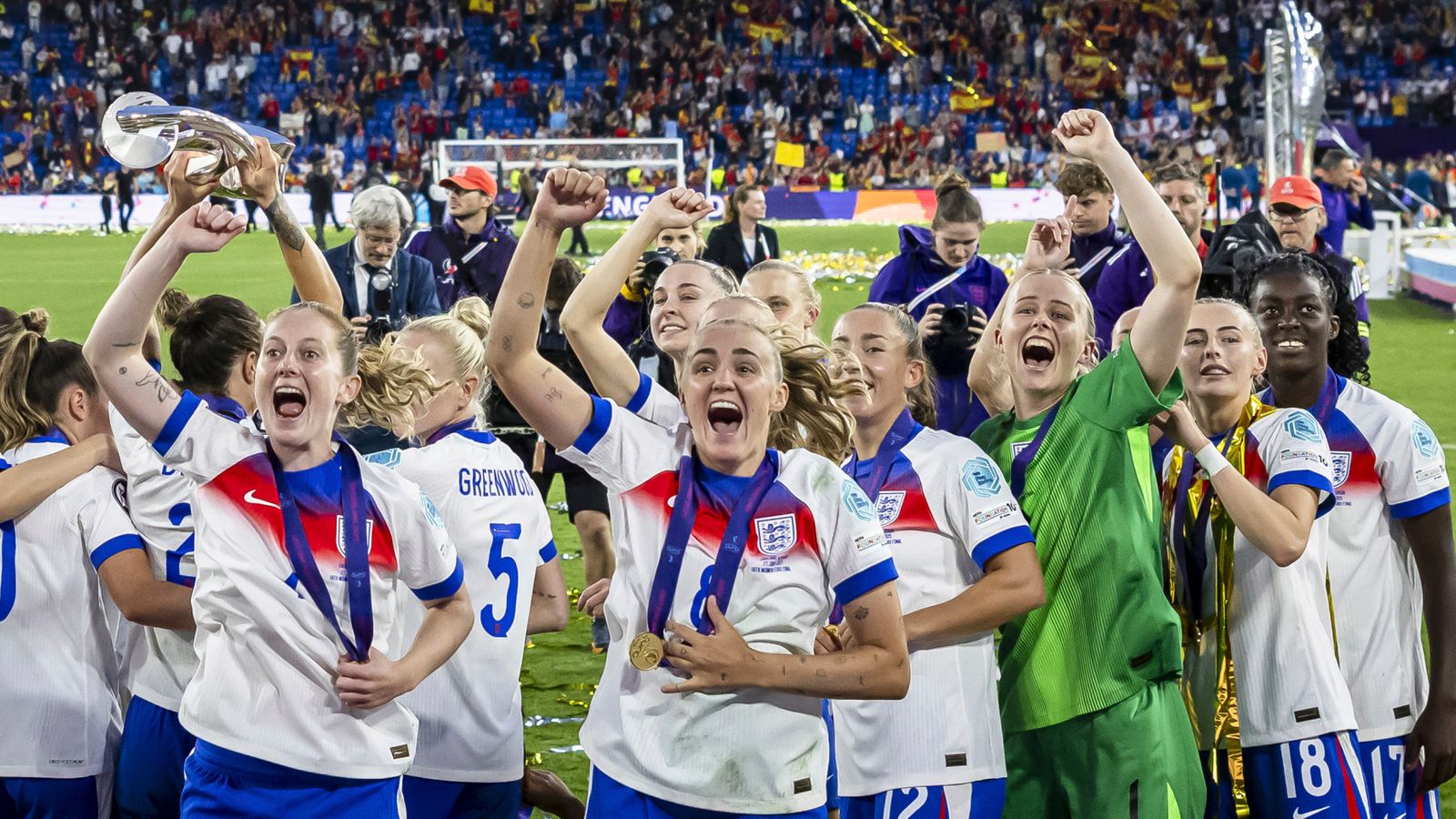It seems like only yesterday that Chloe Kelly was sparking a frenzy at Wembley Stadium as England won Euro 2022, and here she is again, three years on, unleashing absolute pandemonium on the nation once more.
Her four goal contributions at Euro 2025, each as important as the last, will go down in folklore. England’s achievement as a whole will be written into history books as the comeback of all comebacks. As an interpretation of all it means to be proudly English.
In the words of Kelly herself: “We’re English, you can’t ever write us off.”
What was once a pipe dream has been transformed into a profound legacy for the betterment of the women’s game in this country. The term used in promotional messaging for this summer’s Euros in Switzerland was ‘summit’, chosen specifically to pay homage to the mountainous landscape where the tournament took place.
What the word summit means to England in practice, though, goes well beyond the beauty of the Swiss Alps. It’s about the sheer unrelenting will to come out on top against all the odds. To embrace adversity as if it were a routine and regular, even desirable, way to win.
This team are more than champions of Europe. They have grown into a mass movement, and created a dynasty whereby future generations of young girls and boys will recall this moment as the one that inspired their beginning. That ignited their own dream.
And so, in the wake of another momentous conquest – the first England team to prosper on foreign soil – Sky Sports assesses the impact the double European champions have had, and will have on the evolution of women’s football as we know it.
‘Everyone watches the Lionesses’
There is little doubt women’s football has experienced a surge of interest and recognition since the great awakening of England’s Euro 2022 win. Swarms of people across generational divides want a piece of the action.
So much so that the squad’s ‘Everyone watches the Lionesses’ t-shirts are now a part of Nike’s official merchandise range. Euro 2022 was an overwhelming success for England, but also for English sporting culture.
Attendance totals were smashed in Switzerland, helped in no small part by an overwhelmingly strong Three Lions contingent. Sarina Wiegman said she felt like it was a home tournament, which is handy because, before Sunday, she had only ever triumphed in major competitions as the host nation (2017 with Netherlands and 2022 with England).
In total, 657,291 fans pounded the pavements of Geneva, Zurich, Bern and Basel – the four biggest of the eight cities to stage games – comfortably surpassing the previous tournament record set in 2022 (574,875).
Stadium utilisation averaged 97 per cent across the tournament, with group-stage attendance up 25 per cent on three years ago. 29 of the 31 matches were a sell-out and over a third of tickets were purchased by international fans. England were best represented alongside Germany, France and the Netherlands.
“The landscape keeps changing and we’re trying to change with it,” captain Leah Williamson told a packed press room before the final. And the word packed is deliberately used here. Media interest has simultaneously skyrocketed.
“We don’t want to be a flash in the pan or a memory. We’re still trying to play our role by being on this stage, we know how powerful that is. We’re trying to elevate the respect for the women’s game and the respect for women generally.”
Women’s Super League attendances have trended upwards on the back of England’s boom, albeit momentum was lost slightly with no international tournament last summer. Expect a spike to carry into next season, though, as fans flock to see the stars of this history-making team.
Bigger tournaments, higher price
Bigger and bolder undoubtedly equals better, but there is a price to pay. Competition costs – which account for a higher workforce than ever before, extra stadium and security expenses, as well as funded transport – mean UEFA’s projected expenditure rose from €57m (£49.5m) in 2022 to €113m (£98m).
Prize money for competing nations has also increased by 156 per cent.
Raising the quality of TV coverage and inventories for commercial partners was a key part of the funding strategy, with higher attendances also generating more matchday and hospitality revenue. But there is still a long way to go in order to reach the game’s sustainability objectives.
The projected net result for staging the tournament is a €35m (£30m) loss, which marks a significant increase on the €14m (£12m) deficit in 2022.
UEFA describes this as “a clear commitment to further support women’s football” – and greater investment is welcome – but profitability remains a hurdle. While the business of women’s football is far more lucrative than it ever has been, it’s got some way to go to become financially stable.
Another watershed moment
Ask any class of primary school-aged kids if they want to be the next Chloe Kelly or Leah Williamson and hands would shoot up. Most likely, girls and boys. Because this elite group of England athletes holds power like never before. They command respect.
FA CEO Mark Bullingham told Sky Sports just this week: “We know we’ve got a great plan to grow women’s and girls’ football even more than in the last few years, but we just know this is going to turbocharge it even more.”
The durability of this England side has been tested this summer and yet “proper England” – a phrase coined by the players themselves – prevailed. The Lionesses are the gift that keeps giving, all helped by their winning brand. Success is the ultimate sustainer.
An impact study revealed a 140 per cent increase in participation levels following Euro 2022, and a 53 per cent increase in women aged 16 and over, amounting to over 2.3 million new players. Both formal and casual football participation is helpful for the growth of the game and future England teams. FA pathways will be infinitely richer as a result.
A new identity?
England teams of old have taken on many personas, but most have been tainted by the nearly-not-quite brush. The false dawns and near misses made an indelible mark.
Not this England team, though. They will forever be characterised by an enduring record of excellence and nerves of steel. They have forged a reputation so binding that no player inside camp had a shred of doubt entering another final against Spain, widely accepted as the world’s best.
Wiegman’s side could have been beaten four times over in the 120 minutes, and twice over during the penalty shootout, and yet, somehow, the pressure took a greater toll on the world champions than it did England.
Williamson epitomised the conviction: “Total disbelief – but at the same time, I knew it was going to happen. It felt like it was going to be our day.”
This is the hallmark of England Women, one of the greatest teams in British sporting history. The team who continually refuses to be beaten using whatever means necessary – the team whose identity is unequivocally winners.











